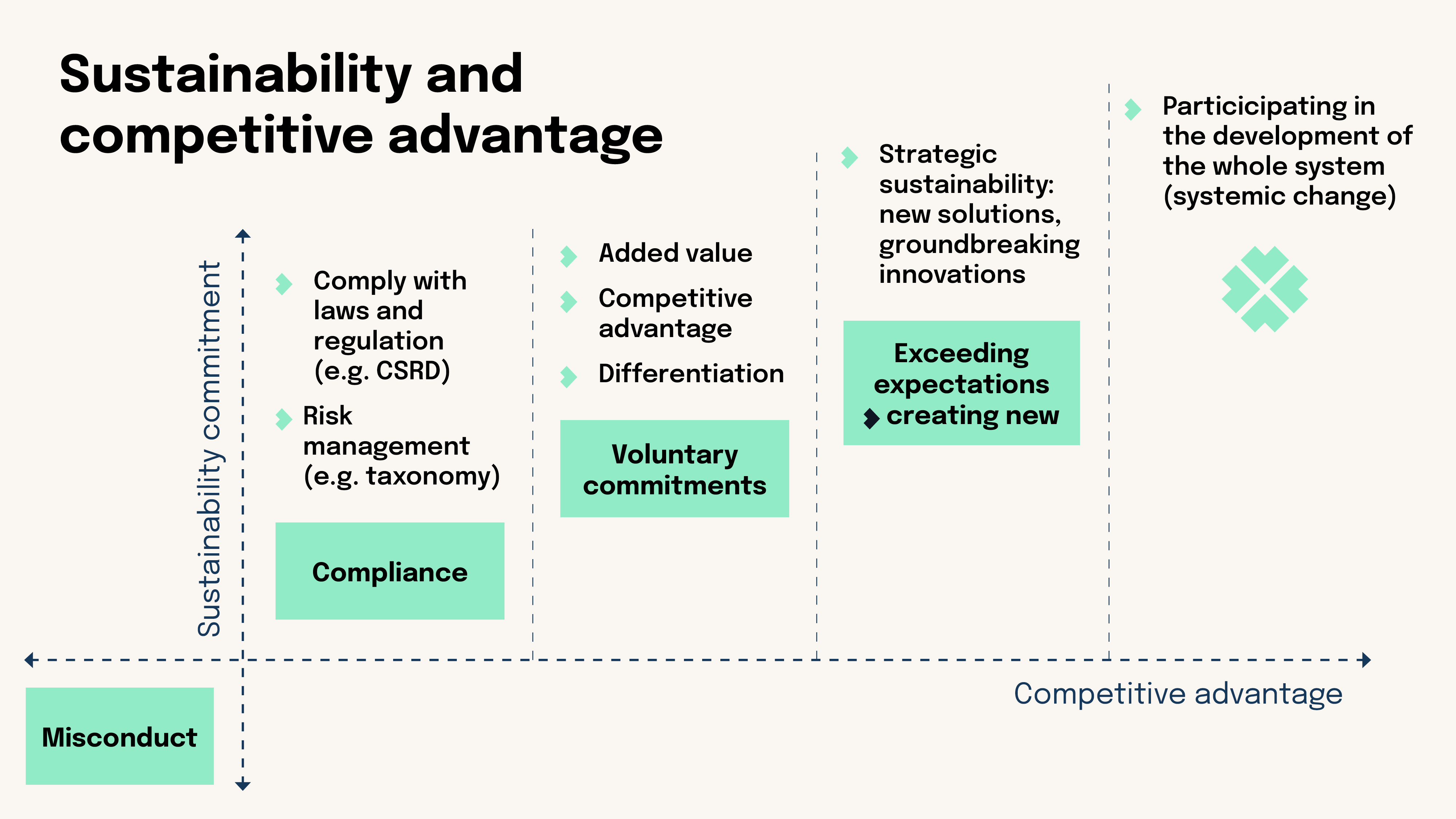Sustainability issues have become a major focus in marketing, communication and thought leadership in both B2B companies and public organisations. For many, this is a challenge and for the fear of greenwashing they struggle to communicate one's own good deeds - or goals. Our advice is: get going, keep improving as you go along and tell about it. The foolish thing to do is to say nothing.

Any action you take to contribute to the well-being of your staff, your customers, society or the environment is worth telling. When you tell about concrete actions, you let the recipient decide for themselves whether your actions are responsible. This is not greenwashing. But, for example, if you claim that the impact of your actions is something you cannot prove, you go down the greenwashing route.
The Greenwashing Directive helps to plan sustainability communication
Nevertheless, with increasing demands for sustainability and reporting, and with organisations and consumers alike taking an interest in the actions of companies, the challenge of greenwashing is real. According to a recent survey by the Finnish Environment Institute, more than half of environmental advertising is inappropriate or misleading.
This has been addressed by the EU Commission, which on 22 March 2023 adopted a proposal for a directive to clarify the ground rules for environmental advertising. The aim is to provide consumers and other operators with reliable and consistent information on the environmental characteristics of a product or service and to reduce greenwashing. Read more about the Green Claims Directive.
The same basic principles apply to communicating responsibility as to building thought leadership in general. The company has a vision of actions and developments that will make a significant contribution to its own growth, and possibly that of the industry as a whole, and to the conditions for future success. It also has the courage to act as a driver of this development - to bring visions and new ideas to the attention of others and to actively build collaboration between different actors to bring about change, to make a difference.
Sustainability communication also aims to make a difference. It raises understanding, encourages, stimulates debate, takes a stand for development, presents business from a slightly different perspective. You cannot sign up to be a responsible or thought leader yourself, it is a trust built up over time and earned by stakeholders.
Reporting pressure from large companies shifts to SMEs acting as subcontractors
Reporting on responsibility and sustainable development activities is an essential part of responsibility communication. A well-drafted report provides information on the impact of your actions and highlights objectives, progress and challenges.
Annual reports, financial reporting and capital market days are the basic communication tasks of listed companies, and sustainability is a fundamental part of their content. Now, the obligation to report on corporate responsibility is increasing and is being extended to a growing number of companies.
The Corporate Sustainability Reporting Directive (CSRD) and related reporting standards that govern sustainability reporting in the EU will apply not only to listed companies, but also to companies that meet two of the three following criteria:
- 250 or more employees,
- a turnover of at least €40 million
- a balance sheet of at least €20 million.
These companies will already have to report for the 2024 financial year under the new statutory corporate sustainability reporting standard. Verification will also become mandatory.
The Corporate Sustainability Due Diligence for listed companies will apply not only to operators meeting the above criteria, but also to high-risk sectors with at least 50% of their turnover derived from food and textile manufacturing, wholesale trade in agricultural raw materials and live animals, or mineral extraction.
It is important to be aware that the increased obligations will also extend to those who do not have to report themselves: the reporting pressure will shift from large companies to SMEs acting as subcontractors.
Companies are at very different stages of development and there is scope for continuous improvement of the basics, even for those who are trailblazers.
The levels of sustainability and communication can be roughly broken down as follows, for example
-
Compliance: the basic level emphasises compliance with legal obligations, risk management and the development of reporting capabilities. This stage typically involves developing a dedicated CSR plan, conducting a materiality analysis and promoting dialogue with stakeholders.
- Developer: those with a longer track record of sustainability work already have voluntary commitments and verifiable results that go beyond compliance, creating value for customers and other stakeholders and a competitive advantage for the company itself. This can also be effectively used for thought leadership profiling.
- A trailblazer: when sustainability is at the core of a company's business strategy, it has the potential to be a driver in its own sector; by innovating and creating new business, it can also reach out to entirely new markets and customer segments. Trailblazers are also drivers of the transition to a low-carbon society, or systemic change.

Whatever stage of development you are at, it's worth telling others about it. Following good sustainability communication recommendations and practices – without greenwashing – creative, high-quality communication and marketing tailored to your situation can build thought leadership, strengthen your brand and employer image.
Want to discuss more? Feel free to contact us!
Kirsi Nurmi
+358 45 271 9559
Director, Senior Consultant
kirsi.nurmi@valve.fi


